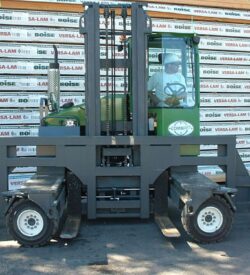Welcome to
On Feet Nation
Members
-
smithmorgan Online
-
Phillip Online
-
Poddar College Online
-
Shirley Online
-
goditac499 Online
-
Sakina Burhan Online
-
evan powers Online
-
-
Blog Posts
Top Content
Mastering Material Handling: Comprehensive Lift Truck and 4-Directional Reach Truck Training
In the dynamic landscape of industrial logistics, the ability to safely and efficiently manage material handling equipment is not just an asset—it's a necessity. As industries increasingly rely on sophisticated machinery to streamline operations, the demand for skilled operators has never been higher. Lift Truck Training and 4 Directional Reach Truck Training are crucial for ensuring that personnel are equipped with the necessary skills and knowledge to operate these machines safely and effectively.

Introduction to the Importance of Certified Training
Lift trucks and reach trucks are staples in warehouses, distribution centers, and manufacturing plants worldwide. However, the convenience and efficiency they offer come with risks; improper handling can lead to serious accidents. Certified training programs are essential to mitigate these risks, ensuring that operators are fully prepared to handle the equipment under various conditions.
Exploring Lift Truck Training
The Lift Truck Training encompasses a wide range of essential skills needed to operate different types of lift trucks, including counterbalance forklifts, pallet trucks, and stackers. This training provides comprehensive knowledge about the operational mechanics of lift trucks, safety practices, and the health regulations surrounding their use. It aims to enhance the operator's understanding of both the capabilities and limitations of these vehicles, fostering a safety-first approach to all material handling tasks.
Why Lift Truck Certification Matters
Obtaining a certification in lift truck operation is not merely about fulfilling a job requirement; it's about committing to workplace safety and operational excellence. Certified operators are recognized for their proficiency in maneuvering heavy equipment, reducing the likelihood of workplace incidents. This not only safeguards the workers' health and safety but also reduces expensive downtime brought on by mishaps or inappropriate material handling.
Advanced Skills with 4 Directional Reach Truck Training
Moving beyond conventional lift trucks, the 4 Directional Reach Truck Training focuses on a specific type of machinery designed for narrow aisle operations, which requires precise control and expert handling. This training covers the unique aspects of four-directional technology, enabling operators to move large loads in tight spaces with confidence and precision. The course includes practical instructions on navigating and operating the 4-directional reach trucks, emphasizing agility and safety.
Implementing Effective Training Programs
Implementing a robust training program involves more than just teaching the basics; it requires a commitment to ongoing education and skill refinement. Effective training programs are characterized by their adaptability to industry changes, the incorporation of technological advancements, and the continuous assessment of operator competencies. Moreover, these programs often offer specialized modules to address specific workplace challenges, ensuring that training remains relevant and comprehensive.
In conclusion, investing in Lift Truck Training and 4 Directional Reach Truck Training is indispensable for businesses that depend on these vehicles for daily operations. These training courses improve operational efficiency and dependability in addition to guaranteeing adherence to safety regulations. For those looking to upgrade their skills or certify their teams, Safetyfirsttraining.ca offers detailed and expertly conducted training courses tailored to meet industry needs. With a focus on practical skills and safety, Safetyfirsttraining.ca is your partner in fostering a competent, confident, and safe workforce.
Our website is a great place to start for more information.
© 2024 Created by PH the vintage.
Powered by
![]()
You need to be a member of On Feet Nation to add comments!
Join On Feet Nation